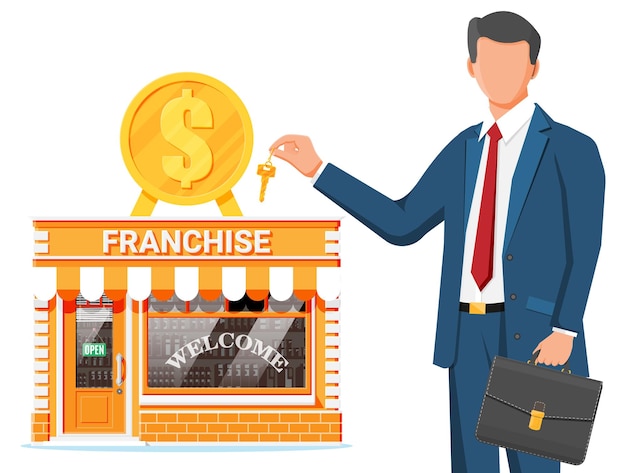Franchising is a business model that allows budding entrepreneurs to start their own business without shouldering too much risk. In a franchise setup, there’s a partnership between the franchisee (the entrepreneur) and the franchisor (the established company). This means the entrepreneur gets to operate a business using the franchisor’s brand and successful business model. Meanwhile, the franchisor expands their brand’s reach without having to manage the new locations themselves.
What makes franchising appealing is the support from the franchisor, which includes training and help, boosting the franchisee’s chance of success. It’s beneficial for both sides; the franchisor grows their brand and the franchisee enters the market under a recognized name.
In the U.S., there are around 775,000 franchise businesses, contributing about $787 billion to the economy. The franchising sector is thriving, offering many growth opportunities for those involved.
Starting a franchise is like starting a relationship. It’s a partnership between you, as the entrepreneur, and a franchise brand you trust. This connection is outlined in an agreement, detailing what each party is responsible for. As an entrepreneur, you invest your money and belief in the franchise, and in return, you use their brand name, logo, and access their expertise and resources. The franchise brand doesn’t leave you to handle it all; they support you with marketing, training, and everyday operations.
Becoming part of a franchise is like joining a club. You pay an initial fee and then regularly share a percentage of your earnings, known as a royalty fee, with the franchise brand. This ongoing fee helps the brand support their franchisees and fund marketing efforts that increase the brand’s visibility, while also supporting training programs to equip you with the skills needed to run your business well. The royalty fee also keeps the operational support from the franchise brand going. Things like new product development and tech upgrades can aid in keeping your business competitive.
The royalty fee essentially allows the franchisee to consistently invest in their growth and success, with the franchise brand in their corner for support when needed.
Buying a franchise is a step toward owning a business. It requires thorough research and consideration. Prospective franchisees should examine the franchisor’s business model, financial status, market reputation, and the level of support they provide. The Franchise Disclosure Document (FDD) is a key resource offering specific insights about the franchisor, franchise system, and agreements, allowing potential franchisees to make an informed choice. Consulting with a franchise expert or attorney can also be beneficial during this process.
The relationship between a franchisee and a franchisor is built on shared goals and values, similar to a mentorship. The franchisor, with their established brand and proven business model, guides you with tools, training, and support needed for success. They share their experience and knowledge, helping you steer clear of common mistakes and towards achievement. As the franchisee, you bring your enthusiasm and dedication, taking charge to flourish your business in your community. This mutually beneficial relationship means your success also grows the franchisor’s revenue.
When deciding whether to become a business owner, entrepreneurs have to choose between investing in a franchise or starting an independent business. Each option has distinct features, benefits, and challenges. Starting an independent business involves crafting a business plan from the ground up and gives you the freedom to make all decisions, though it involves higher risks due to its unproven business model. Building brand recognition and customer trust can be challenging and slow. Independent businesses also often face higher failure rates than franchises, as they typically lack the necessary support.
Franchising, on the other hand, offers an established brand with a proven business model. It provides brand recognition, operational systems, and consistent support from the franchisor. Franchises generally achieve more success compared to independent startups, thanks to the support network and commitment of like-minded individuals. Although franchisees need to adhere to protocols and pay ongoing royalties, the stability and support they receive usually surpass these responsibilities.
Franchising holds several competitive edges over starting an independent business:
- Proven Business Model: Franchises offer a tested blueprint for success, relieving franchisees from guessing and helping them begin on solid ground.
- Brand Recognition: Franchisees benefit from the franchisor’s established brand, saving time and effort normally spent on building a client base from scratch.
- Ongoing Support: Franchisees receive constant support and guidance from the franchisor concerning marketing, training, and operations.
- Lower Risk: Franchising involves less risk compared to startups. The established brand, tried-and-true business model, and support from the franchisor help reduce risks.
While startups offer the potential for high rewards and the freedom to bring an original concept to life with no management limitations, the stability, support, and relative security of a franchise model can be very attractive. This makes franchising a compelling option for entrepreneurs looking to reduce risks while still enjoying the benefits of owning a business.
Among various franchise opportunities, a home inspection franchise presents a promising business option. With growth in the real estate industry and a steady demand for quality home inspections, this franchise model can be quite profitable with the right partner. The relatively low initial investment in this field provides opportunities for budding entrepreneurs focused on sound financial planning. Within the home inspection franchise framework, continuous learning and professional growth are ongoing. The franchisor offers essential training to keep up with industry trends and networking avenues with professionals and potential clients, broadening market reach and credibility.
Home inspection work is diverse and engaging. Every inspection presents unique challenges, keeping the work interesting. Additionally, a successful home inspection franchise can grow and expand, offering further opportunities for success.
Ultimately, franchising involves a partnership that promotes mutual growth and success. It offers a combination of stability and opportunity, making it a compelling choice for entrepreneurs. If you enter the home inspection market, expect to find satisfaction in protecting consumer health, while ensuring fair deals between sellers, real estate agents, and buyers. Here’s to the world of franchising—one of shared success and infinite possibilities!



